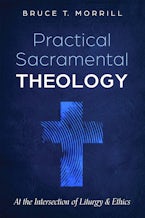Practical Sacramental Theology
At the Intersection of Liturgy and Ethics
Imprint: Cascade Books
What motivates practice of the liturgy and sacramental rites of the church? Does the worship of God begin and end within each ritual enactment, or does the truth and value of sacramental celebration reside in the broader context of Christian life in church and society? For more than two decades, prominent Jesuit sacramental-liturgical theologian Bruce Morrill has explored the promise and problems inherent in the Second Vatican Council's call to renew liturgy's basic purpose--namely, the glorification of God and the sanctification of people. Morrill's fundamental argument is that this ancient Christian principle is of a piece, that divine glory and human holiness are, so to speak, two sides of a single coin. The value of liturgy and sacraments is depleted, if not lost, unless they function within a holistic practice of faith that seeks the upbuilding of ethical lives, personal and social. With numerous real-life examples plus references to current sociological studies, the chapters address both modern challenges to and biblical and traditional resources for the celebration of sacramental rites today.
Bruce T. Morrill, SJ, holds the Edward A. Malloy Chair in Roman Catholic Studies at Vanderbilt University Divinity School. In addition to over 150 articles, chapters, and reviews, he has authored, co-authored, and edited ten books, including Anamnesis as Dangerous Memory (2000), Divine Worship and Human Healing (2009), Encountering Christ in the Eucharist (2012), and The Essential Writings of Bernard Cooke (2016).
“This is a significant contribution by one of our best sacramental-liturgical theologians. Morrill has the enviable ability to read the tradition in light of real-life experience, the social sciences, and the best of contemporary theology. The result is a book which is challenging and provocative but at the same time accessible. I recommend it highly.”
—John F. Baldovin, SJ, Boston College School of Theology and Ministry
“This book is a master class in liturgical and sacramental theology. The gravest pastoral issues, such as clericalism and elitism, are addressed here using robust biblical and liturgical scholarship. Methodological reflection on liturgical studies connects liturgical practice, ethics, and the realities of cultural surroundings and power dynamics. A must-read for present and future ministers as well as liturgical scholars.”
—Kimberly Hope Belcher, University of Notre Dame
“With his unique talent to combine theoretical complexity with pedagogical skill and compelling arguments, Morrill constructs an engaging vision with ample room for nuance and critical reflection. Many readers of this book will find out how their lives as Christians are both explicitly and at a more hidden level inspired by the grand mystery of life and love continued in liturgical and sacramental events.”
—Joris Geldhof, KU Leuven, Belgium











